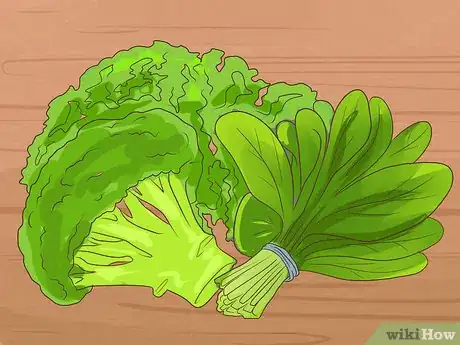This article was co-authored by Michael Lewis, MD, MPH, MBA, FACPM, FACN. Michael D. Lewis, MD, MPH, MBA, FACPM, FACN, is an expert on nutritional interventions for brain health, particularly the prevention and rehabilitation of brain injury. In 2012 upon retiring as a Colonel after 31 years in the U.S. Army, he founded the nonprofit Brain Health Education and Research Institute. He is in private practice in Potomac, Maryland, and is the author of "When Brains Collide: What every athlete and parent should know about the prevention and treatment of concussions and head injuries." He is a graduate of the U.S. Military Academy at West Point and Tulane University School of Medicine. He completed post-graduate training at Walter Reed Army Medical Center, Johns Hopkins University, and Walter Reed Army Institute of Research. Dr. Lewis is board certified and a Fellow of the American College of Preventive Medicine and American College of Nutrition.
There are 18 references cited in this article, which can be found at the bottom of the page.
wikiHow marks an article as reader-approved once it receives enough positive feedback. In this case, 100% of readers who voted found the article helpful, earning it our reader-approved status.
This article has been viewed 307,255 times.
Just like your muscles, your brain needs exercise to keep it in good working order. Keeping a healthy diet, exercising, and getting enough sleep are some of the best ways to make sure your brain stays healthy. Beyond that, there are a few ways to enhance your brainpower. Although results are mixed on increasing actual cognitive function (using measures such as IQ and specific brain tests), learning something new, working your memory, and reading are all great ways to work your brain to its limit!
Steps
Expert Q&A
-
QuestionDo diet and exercise contribute to a healthy brain?
 Michael Lewis, MD, MPH, MBA, FACPM, FACNMichael D. Lewis, MD, MPH, MBA, FACPM, FACN, is an expert on nutritional interventions for brain health, particularly the prevention and rehabilitation of brain injury. In 2012 upon retiring as a Colonel after 31 years in the U.S. Army, he founded the nonprofit Brain Health Education and Research Institute. He is in private practice in Potomac, Maryland, and is the author of "When Brains Collide: What every athlete and parent should know about the prevention and treatment of concussions and head injuries." He is a graduate of the U.S. Military Academy at West Point and Tulane University School of Medicine. He completed post-graduate training at Walter Reed Army Medical Center, Johns Hopkins University, and Walter Reed Army Institute of Research. Dr. Lewis is board certified and a Fellow of the American College of Preventive Medicine and American College of Nutrition.
Michael Lewis, MD, MPH, MBA, FACPM, FACNMichael D. Lewis, MD, MPH, MBA, FACPM, FACN, is an expert on nutritional interventions for brain health, particularly the prevention and rehabilitation of brain injury. In 2012 upon retiring as a Colonel after 31 years in the U.S. Army, he founded the nonprofit Brain Health Education and Research Institute. He is in private practice in Potomac, Maryland, and is the author of "When Brains Collide: What every athlete and parent should know about the prevention and treatment of concussions and head injuries." He is a graduate of the U.S. Military Academy at West Point and Tulane University School of Medicine. He completed post-graduate training at Walter Reed Army Medical Center, Johns Hopkins University, and Walter Reed Army Institute of Research. Dr. Lewis is board certified and a Fellow of the American College of Preventive Medicine and American College of Nutrition.
Board Certified Brain Health Physician Yes, diet and exercise are really important for your cognitive health. Do something to get your heart rate up every day, even if it's just to take a walk after dinner or doing sit-ups in your bedroom before you start your day. Also, eat healthy, like following a Mediterranean-style diet.
Yes, diet and exercise are really important for your cognitive health. Do something to get your heart rate up every day, even if it's just to take a walk after dinner or doing sit-ups in your bedroom before you start your day. Also, eat healthy, like following a Mediterranean-style diet. -
QuestionHow can you prevent cognitive decline?
 Michael Lewis, MD, MPH, MBA, FACPM, FACNMichael D. Lewis, MD, MPH, MBA, FACPM, FACN, is an expert on nutritional interventions for brain health, particularly the prevention and rehabilitation of brain injury. In 2012 upon retiring as a Colonel after 31 years in the U.S. Army, he founded the nonprofit Brain Health Education and Research Institute. He is in private practice in Potomac, Maryland, and is the author of "When Brains Collide: What every athlete and parent should know about the prevention and treatment of concussions and head injuries." He is a graduate of the U.S. Military Academy at West Point and Tulane University School of Medicine. He completed post-graduate training at Walter Reed Army Medical Center, Johns Hopkins University, and Walter Reed Army Institute of Research. Dr. Lewis is board certified and a Fellow of the American College of Preventive Medicine and American College of Nutrition.
Michael Lewis, MD, MPH, MBA, FACPM, FACNMichael D. Lewis, MD, MPH, MBA, FACPM, FACN, is an expert on nutritional interventions for brain health, particularly the prevention and rehabilitation of brain injury. In 2012 upon retiring as a Colonel after 31 years in the U.S. Army, he founded the nonprofit Brain Health Education and Research Institute. He is in private practice in Potomac, Maryland, and is the author of "When Brains Collide: What every athlete and parent should know about the prevention and treatment of concussions and head injuries." He is a graduate of the U.S. Military Academy at West Point and Tulane University School of Medicine. He completed post-graduate training at Walter Reed Army Medical Center, Johns Hopkins University, and Walter Reed Army Institute of Research. Dr. Lewis is board certified and a Fellow of the American College of Preventive Medicine and American College of Nutrition.
Board Certified Brain Health Physician Remaining social is absolutely critical. Socialization will help improve your quality of life—people who are social live longer and live happier.
Remaining social is absolutely critical. Socialization will help improve your quality of life—people who are social live longer and live happier.
References
- ↑ https://www.helpguide.org/articles/healthy-living/how-to-improve-your-memory.htm
- ↑ https://www.sciencedaily.com/releases/2017/09/170906103416.htm
- ↑ https://www.health.harvard.edu/healthbeat/7-ways-to-keep-your-memory-sharp-at-any-age
- ↑ https://developingchild.harvard.edu/science/key-concepts/executive-function/
- ↑ https://www.entrepreneur.com/article/225321
- ↑ https://news.emory.edu/stories/2013/12/esc_novels_change_brain/campus.html
- ↑ https://oedb.org/ilibrarian/your-brain-on-books-10-things-that-happen-to-our-minds-when-we-read/
- ↑ https://www.cdc.gov/physicalactivity/basics/pa-health/index.htm
- ↑ Michael Lewis, MD, MPH, MBA, FACPM, FACN. Board Certified Brain Health Physician. Expert Interview. 18 February 2021.
- ↑ https://www.ncbi.nlm.nih.gov/pmc/articles/PMC2805706/
- ↑ Michael Lewis, MD, MPH, MBA, FACPM, FACN. Board Certified Brain Health Physician. Expert Interview. 18 February 2021.
- ↑ https://www.nih.gov/news-events/nih-research-matters/how-sleep-clears-brain
- ↑ https://www.sciencedirect.com/science/article/pii/S0969996120300954
- ↑ https://www.sleepfoundation.org/how-sleep-works/how-much-sleep-do-we-really-need
- ↑ Michael Lewis, MD, MPH, MBA, FACPM, FACN. Board Certified Brain Health Physician. Expert Interview. 18 February 2021.
- ↑ https://healthybrains.org/pillar-social/
- ↑ https://utswmed.org/conditions-treatments/neurodegenerative-disorders/
- ↑ https://healthybrains.org/pillar-mental/
- ↑ https://journals.sagepub.com/doi/abs/10.1177/1529100616661983
- ↑ https://pubmed.ncbi.nlm.nih.gov/34112925/
About This Article
To train your brain, try to keep learning new things, like an instrument or a foreign language, since learning forms new neural pathways and keeps your brain stimulated. You should also make an effort to remember things instead of relying on the internet, since this improves your memory in the long term. For example, try learning your close friends and family members' phone numbers or learn the lyrics to your favorite song. If you want to improve your language skills and attention span, read a book, magazine, or newspaper regularly. You can also play games like Sudoku, crosswords, and chess to build your problem solving skills. When you’re focusing on something, try to avoid multitasking, since this can easily distract you and decrease your attention span. For more tips, including how to improve your brain function through diet and exercise, read on!












































































Medical Disclaimer
The content of this article is not intended to be a substitute for professional medical advice, examination, diagnosis, or treatment. You should always contact your doctor or other qualified healthcare professional before starting, changing, or stopping any kind of health treatment.
Read More...